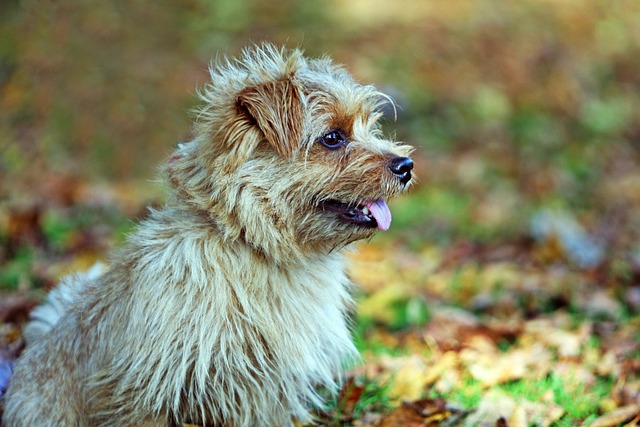


The Norfolk Terrier is a small, affectionate, and energetic breed known for its charming personality and compact size. Originally bred for hunting small vermin, particularly in rural England, the Norfolk Terrier is one of the smallest terrier breeds. Despite their small stature, they are sturdy and confident dogs with a lot of personality. They make excellent companions for individuals or families, and they are well-suited for both apartment living and homes with yards, as long as their exercise needs are met. Their friendly and outgoing nature makes them popular pets, while their intelligence and alertness also make them good watchdogs.
The Norfolk Terrier originated in England in the late 19th century, where it was primarily used for hunting small vermin, such as rats and mice. The breed was closely related to the Norwich Terrier, but they were distinguished by their drop ears. Originally, the two breeds were not separated, and both had similar roles as working terriers. However, in the 1960s, the Norfolk Terrier and the Norwich Terrier were officially recognized as distinct breeds, with the Norfolk Terrier being characterized by its floppy ears, while the Norwich Terrier has erect ears. The Norfolk Terrier was initially bred to work in packs to clear out rodents from barns, stables, and farms, but over time, it became a popular companion dog due to its friendly nature and manageable size. Today, it is still used in some areas for small-game hunting, but it is most often kept as a family pet.
The Norfolk Terrier is a small but sturdy dog, typically weighing between 11 and 12 pounds and standing about 10 inches tall at the shoulder. They have a well-balanced, compact build with a deep chest and a strong, muscular body. The coat is wiry, dense, and weather-resistant, typically coming in colors like red, black and tan, grizzle (a mixture of gray and black), or wheaten. Their ears are small and fold over, adding to their distinctive appearance. The eyes are dark and round, giving them an intelligent and expressive look. Despite their small size, Norfolk Terriers have a lot of energy and are known for being tough little dogs. They have a well-proportioned tail that is often carried straight or slightly curved.
Norfolk Terriers are affectionate, lively, and alert dogs. They have a friendly, outgoing disposition and are generally good-natured with both their family and strangers. Though small, they are confident and often display boldness, making them excellent watchdogs. Norfolk Terriers are known for being social dogs that enjoy being involved in family activities. They are good with children and tend to get along well with other pets, especially if properly socialized from an early age. They are intelligent and curious, often exploring their environment with enthusiasm. Despite their terrier nature, which can sometimes lead to stubbornness, they are eager to please their owners and respond well to positive reinforcement during training. However, they can be independent thinkers and may sometimes display a bit of stubbornness.
Although the Norfolk Terrier is a small breed, it is full of energy and requires regular exercise to stay healthy and happy. Daily walks, playtime, and some time off-leash (in a safe, enclosed area) are important to meet their activity needs. They enjoy engaging in interactive play and can be quite lively, so they do well in homes that can provide them with the mental and physical stimulation they crave. Norfolk Terriers enjoy outdoor activities like exploring the yard, chasing small animals (due to their terrier instincts), and even playing games like fetch. While they do not need the same level of exercise as larger breeds, they do benefit from consistent daily activity to prevent boredom, which can lead to destructive behaviors. A well-exercised Norfolk Terrier will be content to curl up on the couch with its family after an active play session.
The Norfolk Terrier is an intelligent and trainable dog, but like many terriers, it can have a streak of independence and stubbornness. Early socialization is essential to help them become well-adjusted adults, especially with regard to interacting with other animals and people. Socialization should begin when they are puppies, exposing them to different environments, sounds, people, and other pets. This will help them develop confidence and reduce the risk of fear-based behaviors. Positive reinforcement training techniques, such as praise, treats, and toys, work best for Norfolk Terriers, as they tend to respond well to rewards. They enjoy mental stimulation and can excel in obedience training and dog sports, such as agility, when motivated. It is important to keep training sessions fun and engaging to maintain their interest.
The Norfolk Terrier is generally a healthy breed with a lifespan of 12 to 15 years, but like all dogs, they are susceptible to certain health conditions. Some common health issues in the breed include dental problems, hip dysplasia, and patellar luxation (a knee joint issue). Regular veterinary check-ups and maintaining a healthy diet are essential for the well-being of the Norfolk Terrier. Their wiry coat requires regular grooming, including brushing and hand-stripping, to keep it in good condition. It's important to trim their nails regularly, as they can become long and uncomfortable. Their ears should also be checked and cleaned regularly to avoid infections, as their floppy ears can trap moisture and debris. The Norfolk Terrier's dental health should not be overlooked; regular brushing is important to prevent tartar buildup and oral diseases.
The Norfolk Terrier has an average lifespan of 12 to 15 years. With proper care, including regular veterinary visits, a balanced diet, and adequate exercise, they can live long and healthy lives. Regular health screenings, maintaining a healthy weight, and addressing any medical issues early can contribute to a longer lifespan. While generally healthy, they are prone to some genetic conditions, so it’s important to work with a responsible breeder who tests for common breed-related health concerns.
© copyright Dog Compendium 2024 - 2026